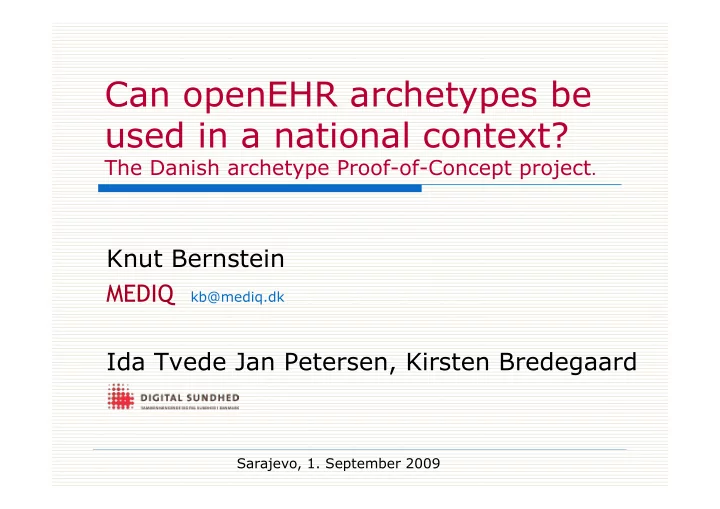

Can openEHR archetypes be used in a national context? The Danish archetype Proof-of-Concept project . Knut Bernstein MEDIQ kb@mediq.dk Ida Tvede Jan Petersen, Kirsten Bredegaard Sarajevo, 1. September 2009
About the organisations Digital Health Danish Government, Danish Regions, Municipalities To implement the National Strategy for Digitalisation of the Health (2008-2012) MEDIQ Independent consultants in health informatics Advice to ministries, regions, hospitals, municipalities in DK and Europe MEDIQ
Disposition The challenge Semantic interoperability The project Is archetypes a part of the solution? Regional track Develop archetypes Vendor track Implement archetypes Conclusions MEDIQ
The ambition: Use and re-use of data Business goals High quality of service, patient safety Cost efficient Support for Clinical decisions, planning and documentation Administration and management Information exchange; sharing of data National/regional EHR National/regional registries Secondary use of data Clinical research, clinical quality development Health and performance monitoring Semantic interoperability MEDIQ
Danish implementations EHR, admin, LAB… Many systems exist Clinical National – infra- Patient semantic structure Registry interoperability is a challenge Continuity The clinical of care Danish infrastructure in DK Health SNOMED is not yet decided! Portal CT But there are candidates… Technical e-Record infra- & medi- structure cation MEDIQ
Clinical infrastructure Interoperable EHR systems Process Terminology Clinical Model System content SNOMED CT Archetypes Proces Terminologi openEHR? Sundheds- Model System fagligt CEN 13606? Indhold HL7 V3? MEDIQ
Purposes of the project Get knowledge on archetype methods and experience on techniques Can archetypes improve representation of clinical content specifications sharing clinical content specifications between different IT-systems Can archetypes be used when entering data in the systems sharing data between systems MEDIQ
Project design Tools Data Entry EHR Use-case Archetypes Clinical content OpenEHR Archetypes Data exchange MEDIQ
Clinical process and Information types MEDIQ The open EHR EHR Information Model Editors:{T Beale, S Heard}1, {D Kalra, D Lloyd}2, Revision: 5.0
Regional track MEDIQ
Modelling from OpenEHR OBSERVATION – obstetric examination Could be represented 9 OpenEHR archetypes 1 new archetype One area with terminology differences Imposing constraints on the maximum dataset using the template Binding to SNOMED CT The result is complex MEDIQ
Obstetric ex. Abdominal examination Ex. of uterus Palpation Ex. of fetus Abdominal ex. Vaginal explor. Vaginal exploration Ex. of cervix Excretion Ex. of fetus Abdominal ex. Vaginal explor. Contractions MEDIQ Heart activity Composition Cluster Entry
Modelling from use-cases OBSERVATION – obstetric examination Could be represented with archetypes Support for structuring Ambiguities resolved The result is easy to overview Use-case specific (minimum dataset) Few reusable elements MEDIQ
Vendor track Tieto: KMS Logica: COSMIC Siemens: Melior CSC: Clinical Suite Systematic : Columna IBM-Acure: NOTAT MyClinic: MyClinic MEDIQ
Import via configuration module ADL, XML MEDIQ
Import and use of archetype Import of ADL or XML straight forward Useful for import of rich data specifications More than archetypes are needed: process descriptions, business logic user interface Using archetypes OBSERVATIONS are particularly useful, can (usually) be integrated with other data EVALUATION, INSTRUCTION, ACTION does not always fit well with internal models
Conclusion: Modelling The clinical content specifications improve on archetype modelling and become computable expressed in a standardised language Sharable OpenEHR archetypes can be used for representing Danish clinical content (probably) Archetypes can provide consistency across a clinical content library MEDIQ
Conclusion: Use of archetypes Danish vendors can handle archetypes via ADL and XML OBSERVATIONS can be imported in Danish systems even they are using different modes Supports interoperability of the exchanged data Constraints should be defined nationally Suggestion: Use archetypes for reporting of data to central databases MEDIQ
Conclusion: Challenges Decision on level of interoperability needed what data, what granularity, which parties Development Guidelines for terminology, AT building blocks Resources for development Implementation Access to archetypes National template library Migration of systems Governance Versioning, distribution, central/local development MEDIQ
Archetypes in a clinical infrastructure Systems Archetypes Quality databases Archetypes National patient DB Patient summary MEDIQ
Archetypes are not that easy to implement When you have pulled your hear long enough… the problem is solved
Contact point Knut Bernstein MEDIQ kb@mediq.dk www.mediq.dk MEDIQ
Recommend
More recommend